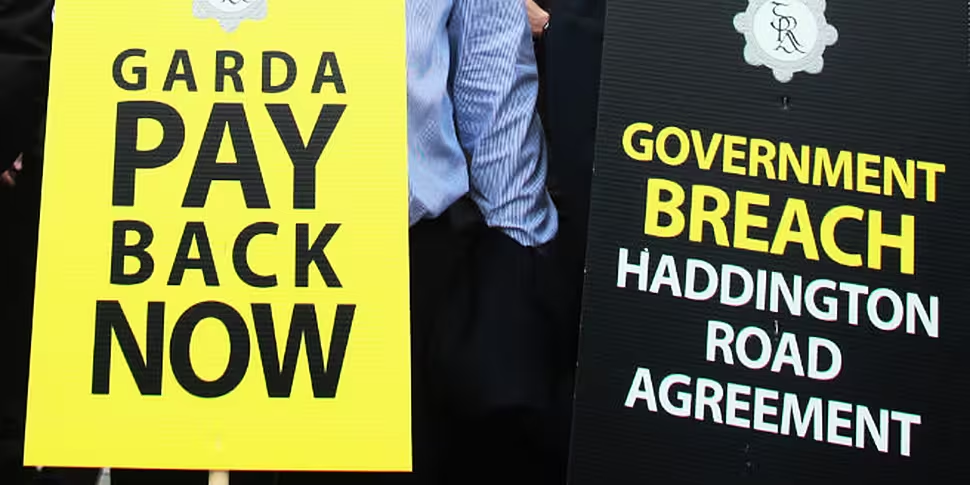The Garda Representative Association (GRA), which represents rank and file gardaí, says their members will withdraw services on four dates this month - with the first scheduled for this coming Friday.
The organisation last month voted for industrial action - up to and including a unilateral withdrawal of services - on November 4th, 11th, 18th and the 25th.
The GRA said: "We have exhausted every channel of industrial relations open to us. Government has taken advantage of our limited rights. Our members feel that we have nowhere left to turn."
They will be joined in their withdrawal by the Association of Garda Sergeants and Inspectors (AGSI), who have also voted to escalate their industrial action. AGSI members have already engaged in two days of 'work-to-rule'.
The GRA yesterday rejected the latest proposed package from the Government aimed at averting the upcoming action, although the AGSI executive is continuing to discuss the matter as of publication.
While talks and efforts to resolve the disputes are likely to continue this week - including a possible Labour Court hearing - it seems increasingly likely that Friday's 'strike' will go ahead.
What are gardaí looking for?
GRA members have been subject to a pay freeze for failing to sign up to the Lansdowne Road Agreement.
The imposition of emergency financial measures - along with the loss of the rent allowance - has left new recruits around €6,000 worse off, the GRA claims.
The GRA say its members are looking for complete pay restoration to 2008 levels.
"Gardaí have legitimate grievances – and it is with vocational reluctance that 95% of the GRA membership feel they have no option but to take industrial action," the association said in a statement.
It says the industrial action will be taken "unless we hear of substantial and significant progress towards real and tangible increases in our pay".
They have also raised concerns about the lack of full union recognition for gardaí, which means they can not fully participate in negotiations such as the ones that led to the Lansdowne Road agreement.
The AGSI has voiced similar concerns:

Image: AGSI
What will happen during the 'strike'?
One thing to note is that the upcoming action is not being described as a 'strike' by the associations involved.
Jim Mulligan, deputy president of the GRA, told Newstalk Breakfast a 'withdrawal of services' means that "members who have told us they are willing to do so will not report for duty on those days".
Similarly, the AGSI has said it is not a strike, and instead individual officers will not be reporting for duty.
Gardaí have assured the public that the country 'will not be abandoned' during industrial action - 999 calls will still be answered and emergencies will be dealt with.
Gardaí say they will break their strike if victims are in danger. However, services such as cash-in-transit deliveries could be disrupted if there is a shortage of officers available.
Mr Mulligan said that he has no doubt that Garda management will have contingency plans in place.
On Newstalk Breakfast this morning, Minster Charlie Flanagan stressed that contingency plans "are well underway" in preparation under the auspices of Justice Minister Frances Fitzgerald.
In terms of a precedent, the 'Blue Flu Day' in 1998 saw around 5,000 gardaí 'call in sick' over pay concerns. A contingency plan was implemented that saw student, probationary and administrative gardaí put on operational duty.
The army was put on standby, while some court sittings were cancelled and some Garda stations closed.
While the full contingency plans have yet to be detailed, it is likely we will see similar measures if the planned action goes ahead this month.
Paul Williams, meanwhile, suggested on Newstalk Breakfast: "I think a lot of guards will still be on duty. [Surveillance officers] do not and will not give up surveillance operations.
"Then you have people in Garda headquarters, [and] there will be specialist detectives who will all come in."
It is unlikely the army will be called in to replace gardaí, the Irish Independent reports, as army personnel do not have Garda powers such as the ability to make arrests.
Is it legal?
The legality surrounding Garda industrial action remains somewhat unclear and untested.
Currently, it is illegal for anybody - whether that is a union or otherwise - to encourage gardaí to withhold their services.
However, in 2014 the European Committee of Social Rights found that Ireland was not in compliance with the European "right to strike of members of the police".
It also found that gardaí should have the right to negotiate pay and join unions.
A proposed bill that would have allowed for gardaí to strike and for garda associations to join trade union umbrella groups was rejected by the Government last year, the Irish Times reported.
Speaking to Pat Kenny, former Justice Minister Nora Owen says gardaí may not be technically breaking the law by withdrawing their services.
"The law on this has never been challenged in court," she explained to Pat Kenny. "And because they're not covered by the 1990 Industrial [Relations] Act, it's hard to know what action can be taken because they are not actually going on strike."
As mentioned above, access to industrial relations processes have been a key demand for Garda associations, and they are looking for full access to the likes of the Workplace Relations Commission to deal with future disputes.
The most recent attempts to avert the planned action have been overseen by the WRC.
In a statement this weekend, the AGSI stressed: "While we are accessing the WRC at the minute it is on an ad hoc basis to deal with the current negotiations. However, the substantial issue of long-term access remains to be resolved.
"We have heard the Minister for Justice committing to providing access to the WRC but AGSI is not aware of any steps having been taken to progress the legislative changes necessary to activate WRC access for our members."









